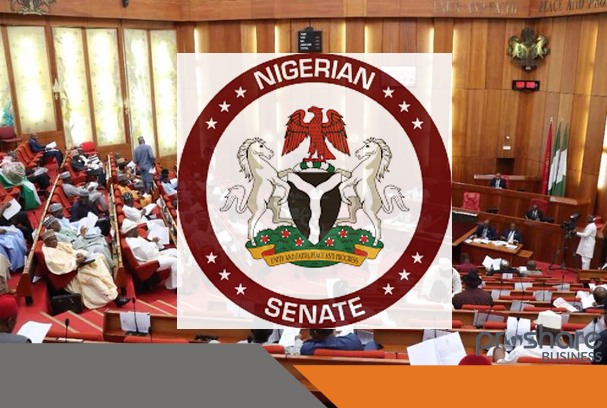…As Abaribe hails Buhari over move to deal with corruption, criminality
The Senate on Tuesday considered a bill that would disrupt the financial flow and funding of criminal enterprise and terrorist financing in Nigeria through the seizure of assets and monies marked as proceeds of crime.
Titled: Proceeds of Crime Bill, 2021, the piece of legislation is sponsored by the Senate Leader, Yahaya Abdullahi (APC, Kebbi North).
Leading debate on the bill, Senator Abdullahi said it seeks to provide for a comprehensive legal and institutional framework for the recovery and management of proceeds of crime or benefits derived from unlawful activities.
He explained that its passage and assent into law would harmonize and consolidate the legal provisions on the recovery of proceeds of crime in Nigeria.
According to the lawmaker, Nigeria had severally attempted to put in place an appropriate Proceeds of Crime legislation since 2007.
“Efforts to develop a comprehensive bill have been impeded by agency rivalry since 2011.
“The effort to sign the Proceeds of Crime Bill into law in 2019 was delayed as a result of complaints by agencies that claimed that the Bill is intended to take away their powers”, the Senate Leader said.
He noted that, “during the evaluation of Nigeria in 2007 by the International Financial Action Task Force (FATF), they observed in their report that the legal framework for the recovery and management of stolen assets in Nigeria is inadequate and do not comply with international standards.”
Abdullahi lamented that due to lack of centrally managed database on recovered assets, effort to track and maintain the actual number of the seized assets, their location and their value is made difficult.
“There have been reported and verifiable instances over the years that showed that some recovered assets were being misused, stolen or lost.
“Further investigations have shown that some of the agencies opened multiple accounts for the payment of forfeited assets without keeping proper records.
“It was against this background that Mr President constituted the Presidential Audit Committee on Recovery of Assets (PACRA) in 2017.
“Not surprisingly, the committee’s findings re-iterated the need for comprehensive and more innovative approach in the management of recovered assets in a transparent and accountable manner so that these assets would become a source of revenue for the country as is the case in many developing and developed countries of the world”, he said.
The lawmaker recalled that sequel to the submission of the report of PACRA in 2018, the President directed that measures be put in place pending the passing of the Proceeds of Crime Bill into law.
Such measures include the establishment of an Asset Recovery and Management Unit in the Federal Ministry of Justice (ARMU/ FMOJ); the opening of a central asset recovery (final forfeiture) account and a central (interim forfeiture) account in the Central Bank of Nigeria; and Use of recovered assets/funds as a source of revenue in the Appropriation Act of 2018 and in subsequent Appropriation Acts.
He explained further that the Proceed of Crime legislation is considered as one of the vital conditions to secure Nigeria’s full membership of the Financial Action Task Force (FATF).
According to him, “Nigeria’s application has remained elusive as the agencies argue to retain their powers at the expense of national interest.”
He stressed that the bill has taken into account the issues raised by the LEAs in relation to their continuing engagement in civil recovery without compromising the international applicable standards in United Nations Conventions.
Abdullahi said, when passed by the National Assembly and assented into law by the President, the bill would provide for the seizure of assets from criminal enterprises, including terrorist organizations, and bandits who undertake their operations with funding from individuals within or outside the country.
“A strong asset recovery measure can also disrupt the activities of these criminal organizations and reduce the level of insecurity in the country”, he said.
Contributing, the Minority Leader, Senator Enyinnaya Abaribe, commended the President Muhammadu Buhari-led administration for the move to have the Proceeds of Crime bill introduced and passed by the National Assembly.
“It is not very unusual to see me get up here and commend this government for bringing an executive bill that is in the interest of the country.
“But this is one of those bills that I want to commend the APC government for taking a step in the right direction, so that we can deal comprehensively with the matter of corruption in Nigeria”, the Minority Leader said.
Senator Bala Ibn Na’Allah, on his part said having such an innovative law that would discourage criminals from engaging in crime for the purpose of financial profits.
The bill after scaling second reading, was referred by the President of the Senate, Ahmad Lawan, to the Committee on a Judiciary, Human Rights and Legal Matters, to report back in two weeks.
Meanwhile, two other bills scaled second reading during plenary on Tuesday.
They are: The National Payment System Bill; and A bill for an Act to provide for the establishment of the Federal University of Agriculture Mpu, Enugu State.
Both bills are sponsored by Senators Sadiq Suleiman Usman (APC, Kwara North); and Ike Ekweremadu (PDP, Enugu West).
The bills after consideration were referred by the Senate President to the Committees on Banking, Finance and other Financial Institutions; and Tertiary Institutions and TETFUND for further legislative work.
The Committee were given two weeks to report back to the upper chamber.

